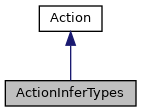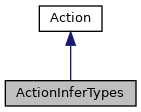Infer and propagate data-types. More...
#include <coreaction.hh>


Public Member Functions | |
| virtual void | reset (Funcdata &data) |
| Reset the Action for a new function. More... | |
| virtual Action * | clone (const ActionGroupList &grouplist) const |
| Clone the Action. More... | |
| virtual int4 | apply (Funcdata &data) |
| Make a single attempt to apply this Action. More... | |
 Public Member Functions inherited from Action Public Member Functions inherited from Action | |
| Action (uint4 f, const string &nm, const string &g) | |
| Base constructor for an Action. More... | |
| virtual void | printStatistics (ostream &s) const |
| Dump statistics to stream. More... | |
| int4 | perform (Funcdata &data) |
| Perform this action (if necessary) More... | |
| bool | setBreakPoint (uint4 tp, const string &specify) |
| Set a breakpoint on this action. More... | |
| virtual void | clearBreakPoints (void) |
| Clear all breakpoints set on this Action. | |
| bool | setWarning (bool val, const string &specify) |
| Set a warning on this action. More... | |
| bool | disableRule (const string &specify) |
| Disable a specific Rule within this. More... | |
| bool | enableRule (const string &specify) |
| Enable a specific Rule within this. More... | |
| virtual void | resetStats (void) |
| Reset all the counts to zero. More... | |
| virtual int4 | print (ostream &s, int4 num, int4 depth) const |
| Print a description of this Action to stream. More... | |
| virtual void | printState (ostream &s) const |
| Print status to stream. More... | |
| virtual Action * | getSubAction (const string &specify) |
| Retrieve a specific sub-action by name. More... | |
| virtual Rule * | getSubRule (const string &specify) |
| Retrieve a specific sub-rule by name. More... | |
Additional Inherited Members | |
 Public Types inherited from Action Public Types inherited from Action | |
| enum | ruleflags { rule_repeatapply = 4, rule_onceperfunc = 8, rule_oneactperfunc = 16, rule_debug = 32, rule_warnings_on = 64, rule_warnings_given = 128 } |
| Boolean behavior properties governing this particular Action. More... | |
| enum | statusflags { status_start =1, status_breakstarthit =2, status_repeat =4, status_mid =8, status_end =16, status_actionbreak =32 } |
| Boolean properties describing the status of an action. More... | |
| enum | breakflags { break_start = 1, tmpbreak_start = 2, break_action = 4, tmpbreak_action = 8 } |
| Break points associated with an Action. More... | |
 Protected Member Functions inherited from Action Protected Member Functions inherited from Action | |
| void | issueWarning (Architecture *glb) |
| Warn that this Action has applied. More... | |
| bool | checkStartBreak (void) |
| Check start breakpoint. More... | |
| bool | checkActionBreak (void) |
| Check action breakpoint. More... | |
 Protected Attributes inherited from Action Protected Attributes inherited from Action | |
| int4 | lcount |
| Changes not including last call to apply() | |
| int4 | count |
| Number of changes made by this action so far. | |
| uint4 | status |
| Current status. | |
| uint4 | breakpoint |
| Breakpoint properties. | |
| uint4 | flags |
| Behavior properties. | |
| uint4 | count_tests |
| Number of times apply() has been called. | |
| uint4 | count_apply |
| Number of times apply() made changes. | |
| string | name |
| Name of the action. | |
| string | basegroup |
| Base group this action belongs to. | |
Detailed Description
Infer and propagate data-types.
Atomic data-types are ordered from most specified to least specified. This is extended rescursively to an ordering on composite data-types via Datatype::typeOrder(). A local data-type is calculated for each Varnode by looking at the data-types expected by the PcodeOps it is directly involved in (as input or output). Every Varnode has 1 chance to propagate its information throughout the graph along COPY,LOAD,STORE,ADD,MULTIEQUAL,and INDIRECT edges. The propagation is done with a depth first search along propagating edges. If the propagated data-type is the same, less than, or if the varnode had been propagated through already, that branch is trimmed. Every edge can theoretically get traversed once, i.e. the search allows the type to propagate through a looping edge, but immediately truncates. This is probably quadratic in the worst case, if each Varnode has a higher type and propagates it to the entire graph. But it is linear in practice, because there are generally only two or three levels of type, so only one or two Varnodes are likely to propagate widely within a component, and the others get truncated immediately. An initial sort on the data-type level of the Varnodes, so that the highest-level types are propagated first, would probably fix the worst-case, but this seems unnecessary. Complications: TYPE_SPACEBASE is a problem because we have to make sure that it doesn't propagate. Also, offsets off of pointers to TYPE_SPACEBASE look up the data-type in the local map. Then ActionRestructure uses data-type information recovered by this algorithm to reconstruct the local map. This causes a feedback loop which allows type information recovered about mapped Varnodes to be propagated to pointer Varnodes which point to the mapped object. Unfortunately under rare circumstances, this feedback-loop does not converge for some reason. Rather than hunt this down, I've put an arbitrary iteration limit on the data-type propagation algorithm, which reports a warning if the limit is reached and then aborts additional propagation so that decompiling can terminate.
Member Function Documentation
◆ apply()
|
virtual |
Make a single attempt to apply this Action.
This is the main entry point for applying changes to a function that are specific to this Action. The method can inspect whatever it wants to decide if the Action does or does not apply. Changes are indicated by incrementing the count field.
- Parameters
-
data is the function to inspect/modify
- Returns
- 0 for a complete application, -1 for a partial completion (due to breakpoint)
Implements Action.
◆ clone()
|
inlinevirtual |
◆ reset()
|
inlinevirtual |
The documentation for this class was generated from the following files:
- coreaction.hh
- coreaction.cc
 1.8.17
1.8.17